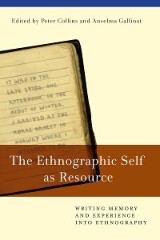Details

The Ethnographic Self as Resource
Writing Memory and Experience into Ethnography1. Aufl.
|
38,99 € |
|
| Verlag: | Berghahn Books |
| Format: | EPUB |
| Veröffentl.: | 01.05.2010 |
| ISBN/EAN: | 9781845458287 |
| Sprache: | englisch |
| Anzahl Seiten: | 270 |
DRM-geschütztes eBook, Sie benötigen z.B. Adobe Digital Editions und eine Adobe ID zum Lesen.
Beschreibungen
<p> It is commonly acknowledged that anthropologists use personal experiences to inform their writing. However, it is often assumed that only fieldwork experiences are relevant and that the personal appears only in the form of self-reflexivity. This book takes a step beyond anthropology at home and auto-ethnography and shows how anthropologists can include their memories and experiences as ethnographic data in their writing. It discusses issues such as authenticity, translation and ethics in relation to the self, and offers a new perspective on doing ethnographic fieldwork.</p>
<p> <strong>Prologue</strong><br> <i>Peter Collins</i> and <i>Anselma Gallinat</i></p>
<p> <b>Chapter 1.</b> The Ethnographic Self as Resource: an Introduction<br> <i>Peter Collins</i> and <i>Anselma Gallinat</i></p>
<p> <b>PART I: BEING SELF AND OTHER: ANTHROPOLOGISTS AT HOME</b></p>
<p> <b>Chapter 2.</b> Playing the Native Card: the Anthropologist as Informant in Eastern Germany<br> <em>Anselma Gallinat</em></p>
<p> <b>Chapter 3.</b> Foregroundingthe Self in Fieldwork among Rural Women in Croatia<br> <i>Lynette Sikic-Micanovic</i></p>
<p> <b>Chapter 4.</b> Some Reflections on the ‘Enchantments’ of Village Life, or Whose Story is This?<br> <i>Anne Kathrine Larsen</i></p>
<p> <b>Chapter 5.</b> The Ethics of Participant Observation: Personal Reflections on Fieldwork in England<br> <i>Nigel Rapport</i></p>
<p> <b>PART II: WORKING ON/WITH/THROUGH MEMORY</b></p>
<p> <b>Chapter 6.</b> Ethnographers as Language Learners: From Oblivion and Towards an Echo<br> <i>Alison Phipps</i></p>
<p> <b>Chapter 7.</b> Leading Questions and Body Memories: a Case of Phenomenology and Physical Ethnography in the Dance Interview<br> <i>Jonathan Skinner</i></p>
<p> <b>Chapter 8.</b> Dualling Memories: Twinship and the Disembodiment of Identity<br> <i>Dona Lee Davis</i> and <i>Dorothy I. Davis</i></p>
<p> <b>Chapter 9.</b> Remembering and the Ethnography of Children’s Sports<br> <i>Noel Dyck</i></p>
<p> <b>Chapter 10.</b> Gardening in Time: Happiness and Memory in American Horticulture<br> <i>Jane Nadel-Klein</i></p>
<p> <b>PART III: ETHNOGRAPHIC SELVES THROUGH TIME</b></p>
<p> <b>Chapter 11.</b> The Role of Serendipity and Memory in Experiencing Fields<br> <i>Tamara Kohn</i></p>
<p> <b>Chapter 12.</b> Serendipities, Uncertainties and Improvisations in Movement and Migration<br> <i>Vered Amit</i></p>
<p> <b>Chapter 13.</b> On Remembering and Forgetting in Writing and Fieldwork<br> <i>Simon Coleman</i></p>
<p> <b>Chapter 14.</b> The Ethnographic Self as Resource?<br> <i>Peter Collins</i></p>
<p> <b>Chapter 15.</b> Epilogue: What a Story we Anthropolgists Have to Tell!<br> <i>James W. Fernandez</i></p>
<p> Notes on Contributors<br> Index</p>
<p> <b>Chapter 1.</b> The Ethnographic Self as Resource: an Introduction<br> <i>Peter Collins</i> and <i>Anselma Gallinat</i></p>
<p> <b>PART I: BEING SELF AND OTHER: ANTHROPOLOGISTS AT HOME</b></p>
<p> <b>Chapter 2.</b> Playing the Native Card: the Anthropologist as Informant in Eastern Germany<br> <em>Anselma Gallinat</em></p>
<p> <b>Chapter 3.</b> Foregroundingthe Self in Fieldwork among Rural Women in Croatia<br> <i>Lynette Sikic-Micanovic</i></p>
<p> <b>Chapter 4.</b> Some Reflections on the ‘Enchantments’ of Village Life, or Whose Story is This?<br> <i>Anne Kathrine Larsen</i></p>
<p> <b>Chapter 5.</b> The Ethics of Participant Observation: Personal Reflections on Fieldwork in England<br> <i>Nigel Rapport</i></p>
<p> <b>PART II: WORKING ON/WITH/THROUGH MEMORY</b></p>
<p> <b>Chapter 6.</b> Ethnographers as Language Learners: From Oblivion and Towards an Echo<br> <i>Alison Phipps</i></p>
<p> <b>Chapter 7.</b> Leading Questions and Body Memories: a Case of Phenomenology and Physical Ethnography in the Dance Interview<br> <i>Jonathan Skinner</i></p>
<p> <b>Chapter 8.</b> Dualling Memories: Twinship and the Disembodiment of Identity<br> <i>Dona Lee Davis</i> and <i>Dorothy I. Davis</i></p>
<p> <b>Chapter 9.</b> Remembering and the Ethnography of Children’s Sports<br> <i>Noel Dyck</i></p>
<p> <b>Chapter 10.</b> Gardening in Time: Happiness and Memory in American Horticulture<br> <i>Jane Nadel-Klein</i></p>
<p> <b>PART III: ETHNOGRAPHIC SELVES THROUGH TIME</b></p>
<p> <b>Chapter 11.</b> The Role of Serendipity and Memory in Experiencing Fields<br> <i>Tamara Kohn</i></p>
<p> <b>Chapter 12.</b> Serendipities, Uncertainties and Improvisations in Movement and Migration<br> <i>Vered Amit</i></p>
<p> <b>Chapter 13.</b> On Remembering and Forgetting in Writing and Fieldwork<br> <i>Simon Coleman</i></p>
<p> <b>Chapter 14.</b> The Ethnographic Self as Resource?<br> <i>Peter Collins</i></p>
<p> <b>Chapter 15.</b> Epilogue: What a Story we Anthropolgists Have to Tell!<br> <i>James W. Fernandez</i></p>
<p> Notes on Contributors<br> Index</p>
<p> <b>Anselma Gallinat</b> received a PhD in Social Anthropology from the University of Durham in 2002 and has worked as a Research Assistant and Associate on applied projects. She is currently a Reader in Social Anthropology at Newcastle University (UK). She has worked on questions of sociocultural change, narrative, identity, and most recently memory and morality in eastern Germany.</p>
Diese Produkte könnten Sie auch interessieren:

Identifying, Assessing, and Treating Autism at School

von: Stephen E. Brock, Shane R. Jimerson, Robin L. Hansen

96,29 €

How to Become an Effective Course Director

von: Bruce W. Newton, Jay H. Menna, Patrick W. Tank

64,19 €














